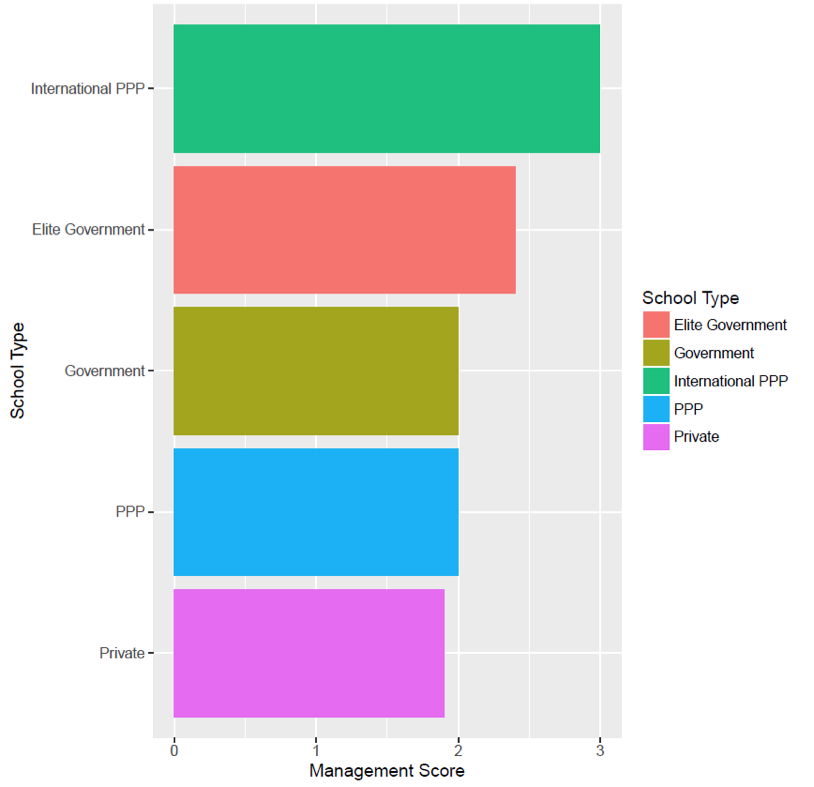Maryam Akmal
Center for Global Development
Blog
Much has been written about the difference in education outcomes between public and public-private partnership (PPP) schools. According to a review by Ark, so far there is insufficient or modest evidence linking PPPs—including contract schools, subsidies, and vouchers—with better learning outcomes (as distinct from evidence about public versus private [non-PPP] schools).
A new CGD study looks at the impact of outsourcing the management of some government schools to private operators in Liberia. The study yields a mixed bag of results. On the plus side, one year of outsourcing management to private operators raised learning by 0.6 extra years of schooling compared to other public schools, a pretty substantial impact. But there are caveats: costs were higher, PPP schools were better-staffed, there was heterogeneity in performance among operators, and the largest contractor was allowed to transfer excess pupils and underperforming teachers to other government schools.
Could alternative school arrangements, such as contract schools, potentially improve learning outcomes? One key mechanism by which contract schools could deliver better learning outcomes is through different management structures that may offer greater autonomy in school- and teacher-level decision-making. A vast literature links better management practices, in particular a greater degree of autonomy, with better performance (Dobbie & Fryer, 2013; Angrist et al., 2013). However, most of these studies are focused in developed country contexts with well-functioning accountability mechanisms. In fact, cross-country studies suggest that increases in school autonomy lead to better performance in high-income countries but worse performance in low- and middle-income countries (Hanushek et al., 2013; Contreras, 2015).
A recent RISE working paper by Lee Crawfurd looks at two main questions in the Ugandan context: First, does school management affect student test scores? Second, is there a difference in management quality between public, private, and PPP schools that could be linked to those different test score results?
Figure 1. Management Scores by School Type in Uganda

Source: Own visualization based on data from Crawfurd, L. (2017)
The results show that school management quality (as measured using an adapted version of World Management Survey) matters for student value-added. A one standard deviation improvement in management quality is associated with a 0.06 standard deviation improvement in test scores.
But while management is related to performance across schools, the study found no difference in school management quality in government, private, and PPP schools, despite the higher level of autonomy potentially available to PPP schools. In fact, public and PPP schools tend to have the same average management scores. Private schools only trail slightly behind. An international PPP performs the best, followed by elite government schools. Therefore, the paper leaves the role of management in producing the private school premium largely unexplained. This supports previous research, like that in Chile (Vegas, 2002), showing that while characteristics of the school like the autonomy of teachers in the classroom matters, these characteristics are not strongly associated with broad school type. More recent research by Barrera-Osorio et al. (2016) looking at subsidy-based PPP schools in Uganda also finds that participation in the program does not change private school governance in a systematic way.
Among non-elite schools there is little correlation between school fees or other school resources and management performance—implying that better management practices could be a low-cost strategy for improving learning outcomes. Yet most non-elite schools do not adopt better management practices. It is possible that most school leaders are not aware of good modern management practices or how to implement them.
The study from Uganda shows that management quality does matter for learning outcomes, but public and public-private partnership schools do not differ on a commonly used measure of school management. A key aim of the RISE programme is to look beyond the results of specific inputs and interventions and to take holistic views of systems—and “management” is itself one of the key accountability relationships driving outcomes in education systems.
RISE blog posts and podcasts reflect the views of the authors and do not necessarily represent the views of the organisation or our funders.